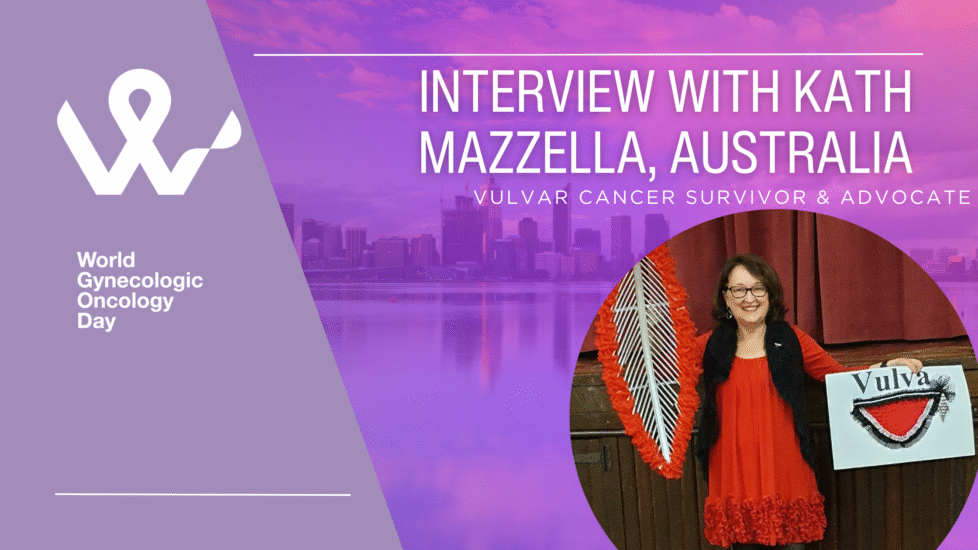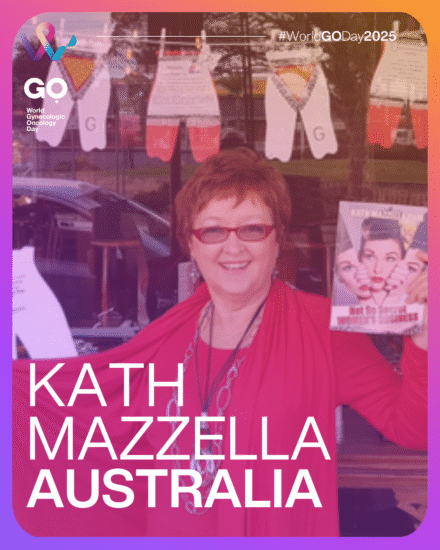
We had a great chat with vulvar cancer survivor and gynecological health awareness advocate Kath Mazella from Australia about her activities, in particular the Red Knicker project and International Gynaecological Awareness Day (September 10). Watch the full interview on our Instagram Reels or read the excerpt below!
World Gynecologic Oncology Day
Could you tell us something about yourself?
Kath Mazzella
I had a radical vulvectomy 30 years ago. The removal of my clitoris, vulva and lymph glands. Then I had six weeks radiation, which put me into menopause, age 42. And it was just a complete mess. Eighteen months later, my husband had five bypasses—I'd like to bring men in the picture here, because, you know, all the fathers and the brothers and the men out there, they need to have better awareness, the same as women.
World Gynecologic Oncology Day
That must have been a very difficult year for your family.
Kath Mazzella
It was a huge challenge having three teenagers in the house and everything. It was unbelievable, but I know other women that suffer the same, and that's why I speak out, 30 years later that we need to do something about this. We can't keep hiding and pretending this is not happening to women.
World Gynecologic Oncology Day
How did you get started with advocacy work?
Kath Mazzella
Well, I turned to the women's organizations, and I noticed that it was mostly men that were in charge of gynecological health, but when we went to the women's organizations, there was no power, and it's like, you didn't fit in here. You know, “you can't talk about those things because it's offensive.”
I found a woman who had exactly the same as me, and I remember her lifting her dress, and I lifted mine, and I thought, “oh my gosh, this is not really happening.”
I found the word pudendum and the Latin version of that word says female genitalia, the shameful part of a woman. And I thought, I can't be ashamed about what happened to me. I've seen these women that were dying and suffering in silence, and the husbands and their families suffering, and I thought I you know, perhaps this happened to me for a reason. And so here I am today.
World Gynecologic Oncology Day
It’s such an interesting insight that people were sending you letters. They were able to tell you about their vulva cancer in confidence. But then when you went to a public forum or some space where, where they would have to be heard, maybe by men in addition to women, then people didn't want to speak.
Kath Mazzella
That’s right, they were too frightened. And then when you have a look at the history around the vulva and gynecological health, it's a very complex thing. And I just, I just couldn't understand why this would happen to me and the other women suffering, and yet the women didn't have power.
World Gynecologic Oncology Day
That leads us to International Gynecological Awareness Day. On the 10th of September, Kath has begun IGAD, a day for us all to talk about gynecological health. For example, going to an exam understanding the language you should use to talk about your female body, because some people are even too shy to say the word vulva or vagina, right?
Kath Mazzella
Well, yes, I mean, there seems to be a lot of confusion.
We're not confused about which bit is a penis, and which one is a testicle. But for some reason or other, we're still holding on to this.
I performed at The Vagina Monologues once, and they were saying, “My vagina, my vagina.” And I thought—but you're holding on to your vulva!
It’s like, let's start to change things around and be more positive about the vulva, because it's such a sensitive, human part of our body and our anatomy. And trust me, people, you do not know what you've got until it's gone.
World Gynecologic Oncology Day
Neither Kath nor I are medical professionals, but vulvar cancer can quite frequently be self-checked. Just the way we are taught to do breast self-checks every month to see if there's lump, you can also check your vulva to see if there are signs. Every woman should be doing a vulva self-check pretty much every month, I think is the current recommendation.
Kath Mazzella
And I have to say, in my early days when I was diagnosed, well, I was given the brochures for many years, and the vulva would be cut off the picture. I was treated like, you know, as the devil herself trying to put in a drawing of a vulva. As if I'm trying to create pornography, but it's got nothing to do with that at all. But that's just some of the obstacles.
World Gynecologic Oncology Day
You said that you had never heard of someone with vulva cancer before you were diagnosed. Is that right?
Kath Mazzella
Well, most women say that you know. They've never heard of it until it hits you, and that's why you've got to be empowered yourself to check yourself and understand.
And a lot of women have lichen sclerosus. I believe one in 80 women have lichen sclerosis, which is an irritation of the vulva. But a lot of doctors are still treating it as thrush. This is where we need to educate the doctors as well, you know, around these issues.
I am an associate investigator for the Queensland epidemiology and where they're doing studies on vulva cancer, but because there's not a lot of talk about it, the funding is not really readily available. So I think the more pressure we put on it, the more we talk about it, the more funding and research we can gather.
World Gynecologic Oncology Day
Could you tell us about the Red Knicker project?
Kath Mazzella
I had to find a way to think, well, how can we progress? And I love the red for the blood and the black for the power and the white for the purity of women and I just thought, well, red knickers are a little bit sexy, and, you know, it's just a bit of fun.
The red knickers is a new, fresh way to be able to, you know, put some fun into it.

World Gynecologic Oncology Day
What do you think are some of the big challenges facing gynecological cancer patients in Australia?
Kath Mazzella
Well, again, it's conversations, and it's allowing people like me to be able to come out and speak, because a lot of women are afraid to speak out.
World Gynecologic Oncology Day
This year and last year our campaign has focused on stigma, and this is something that obviously you have been working with a lot. What do you say to someone who you know shares with you that they have vulva cancer or another gynecological cancer and they're worried about the stigma surrounding it?
Kath Mazzella
Well, I say them to be bold and to be brave and, you know, and step out of your comfort zone, because it's very empowering. You know, I feel as though I'm an empowered woman now, even though the devastation I've had.
But, you know, you've got to step up. Also follow people like me, people that are brave enough to speak out. And, yeah, find the leaders that will let you be heard.
It’s quite disappointing that a lot of women leaders are still quite conservative, because I guess they've got their reputations to keep up. But it's hard for women like me and other patients that want to be heard.
I have seen women die from vulva cancer, and they plead with me, “Please, Kath, you know, spread the word and get out there and share the message.” But if the leaders don't let you through, well then, it's a real challenge to be heard, so you just got to keep standing up and pushing the cart.
Also, join other organizations, go and join those groups to feel like you belong.
I would say to those that want to be advocates, you don't have to be perfect in what you do. I was always trying to be perfect and say and do all the right things. And some of my work, it's not, you know, exactly, professional, but I do the best that I can in an effort to save lives. So it's the passion that drives you. It doesn't matter what people say to you.
I remember, I was interviewed for a commission on discrimination against women, and there was a female professor there, and on the panel, she said, “Oh, I'm embarrassed.”
And I thought—oh, no, what's she going to say? I felt like she was going to crucify me.
She said, “I fought for women's organizations for many years, but I did not know that this was happening to women.”
World Gynecologic Oncology Day
Do you have any other final thoughts?
Kath Mazzella
I'd like to say, let's all work together.
I'd like to say that your body is nothing to be ashamed of.
It's your life. So you know—you do what you will with it.
The stigma belongs to society. It just doesn't belong to you. And so what you can do can go a long way to help save women in the world. Find someone you trust to speak openly. Remember your story might save someone else's life. I know that I have saved some women's lives, and it makes me feel good just by speaking out. So, you know, stand up and be strong.
And, yeah, I'm free if anybody wants to have a chat about how we can progress forward!
World Gynecologic Oncology Day
Thanks again, Kath. We really appreciate your time today and also your tireless work for women's cancer.
Kath Mazzella
Wonderful. And viva la vulva to you!



